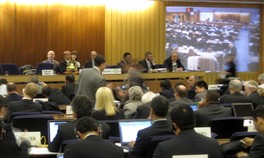Rebate Mechanism & MEPC 60
 Some progress on addressing greenhouse gas (GHG) emissions from ships was made at the IMO MEPC 60 session. IUCN submitted a proposal for an innovative rebate mechanism, based on our work. The proposal (MEPC 60/4/55)
Some progress on addressing greenhouse gas (GHG) emissions from ships was made at the IMO MEPC 60 session. IUCN submitted a proposal for an innovative rebate mechanism, based on our work. The proposal (MEPC 60/4/55) ![]() , which aims to reconcile the principles of the UNFCCC and IMO, was welcomed but not debated. MEPC agreed to establish an Expert Group on Market Based Measures (MBM-EG) to study it, among other proposals.
, which aims to reconcile the principles of the UNFCCC and IMO, was welcomed but not debated. MEPC agreed to establish an Expert Group on Market Based Measures (MBM-EG) to study it, among other proposals.
The Copenhagen Climate Change Conference in Dec 2009 (COP 15) did not resolve any issues on GHG emissions for the IMO. Therefore, as before at MEPC 58 and MEPC 59, they were contentious at the 60th session of the IMO's Marine Environment Protection Committee (MEPC 60), which took place in London, UK, from 22 - 26 March 2010.
The most contentious issue was whether or not to explicitly take the CBDR principle into account, especially while considering market-based measures (MBM), or instruments (CBDR refers to common but differentiated responsibilities and respective capabilities, enshrined in UNFCCC).
The other contentious issues were whether the measures to reduce GHG emissions from ships should be mandatory, whether the technical measures should be implemented through an amendment of MARPOL convention's Annex VI, and whether the proposed measures were mature enough. In general, the positions of developed and developing countries were opposed on all these issues. Another potentially dividing issue of setting a global emission reduction target for GHG emissions from international shipping was not debated, albeit a couple of papers were shortly outlined.
Some progress was made in the further development of the Energy Efficiency Design Index (EEDI) and related items, but more needs to be done. All the other important issues, including MBM such as the one proposed by IUCN, still need in depth discussions.
To make progress on these issues, MEPC:
- established an intersessional Working Group, specifically on issues concerning ship size, target dates and reduction rate in relation to EEDI;
- agreed to establish an Expert Group on MBM (MBM-EG) to undertake a feasibility study and impact assessment of ten relevant proposals submitted. The proposals include emissions trading, a fuel levy or contribution, and the rebate mechanism (IUCN);
- agreed that the debate on the reduction targets was a vital part of GHG work, and invited further input to the next session.
Additional detail on progress achieved at MEPC 60 is available from the IMO.
Summary of the rebate mechanism for a market-based instrument for international shipping
Document MEPC 60/4/55 ![]() proposes a rebate mechanism for a market-based instrument (MBI) for international shipping in order to deliver on the UNFCCC principle of common but differentiated responsibilities and respective capabilities (CBDR). The rebate mechanism could ensure that developing countries are not disadvantaged by a yet to be decided MBI but rather benefit from it.
proposes a rebate mechanism for a market-based instrument (MBI) for international shipping in order to deliver on the UNFCCC principle of common but differentiated responsibilities and respective capabilities (CBDR). The rebate mechanism could ensure that developing countries are not disadvantaged by a yet to be decided MBI but rather benefit from it.
The proposed rebate mechanism can apply to any MBI for international shipping.
Also available are:
- MEPC 60/4/55 in French
 , Mécanisme de remboursement dans le cadre de l'instrument fondé sur le marché destiné aux transports maritimes internationaux
, Mécanisme de remboursement dans le cadre de l'instrument fondé sur le marché destiné aux transports maritimes internationaux
- MEPC 60/4/55 in Spanish
 , Mecanismo de reembolso para un instrumento de mercado para el transporte marítimo internacional
, Mecanismo de reembolso para un instrumento de mercado para el transporte marítimo internacional
- A short overview presentation (in English)

- Further details submitted to MEPC 61
Update on shipping emissions and climate financing outside of IMO
The financing aspect of a potential levy on emissions from shipping, or a similar MBI, is increasingly getting more attention. The high-level Advisory Group on Financing of Climate Change (AGF), established by the UN Secretary General considers it as one contributing option. Their goal is to identify sources of innovative financing to mobilize $100bn annually, from developed countries, by 2020. This is to fuflfill commitments incorporated in the Copenhagen Accord, 2009. The rebate mechanism would guarantee that the financing is from the developed countries only, as agreed.
In another development, Botswana in its recent UNFCCC submission reminded about relevant negotiations during COP 15. In short, the draft negotiating text anticipated using revenue raised from a shipping MBI (and aviation) for climate change action in developing countries.